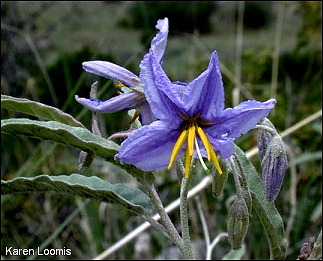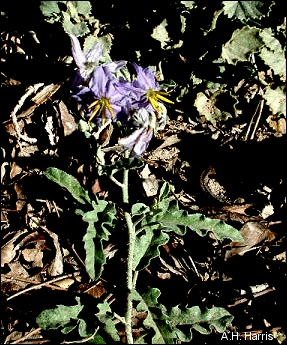

To some, the nightshade family of plants conjures up images of royalty collapsing after sipping from poisoned chalices, or of mystical medieval hallucinogenic rites. This is not entirely without cause, for such plants as Deadly Belladonna and Sacred Datura—both capable of producing death—enjoy familyhood. Such is the reputation, however, that Europeans distrusted even that mainstay of modern salads, the tomato. Other beneficial kinds abound, including potatoes, eggplant, and chili peppers.
Even the those capable of dealing destruction are not without their
charm. Silverleaf Nightshade, or Trompillo, is a common weed in the Chihuahuan Desert
and can kill livestock, wild animals, and even humans unwise enough to eat it. Yet
it's lavender and yellow flowers brighten many a yard or roadside otherwise without
merit, and it apparently was used by Native Americans historically in the making of
cheese, for easing sore throats and toothaches, and for relieving the itch of poison
ivy. Its sinister side comes with a warning—harsh prickles usually festoon its leaves
and stems, so that only the desperate eat and sicken.

Listen to the Audio (mp3 format) as recorded by KTEP, Public Radio for the Southwest.
Contributor: Arthur H. Harris, Laboratory for Environmental Biology, Centennial Museum, University of Texas at El Paso.
Desert Diary is a joint production of the Centennial Museum and KTEP National Public Radio, University of Texas at El Paso.

Flower of Silverleaf Nightshade (Solanum elaeagnifolium). Photograph by Karen Loomis.

View of Silverleaf Nightshade, showing growth form. Photograph by A.H. Harris.
Silverleaf Nightshade spreads readily by underground stems (rhizomes), often becoming difficult to eradicate from areas where it is not wanted. The alkaloids responsible for its deadly nature tend to be concentrated in the ball-like, yellowish fruits, though widespread through the plant.